What should be done about plastic bags?
- Published
- comments
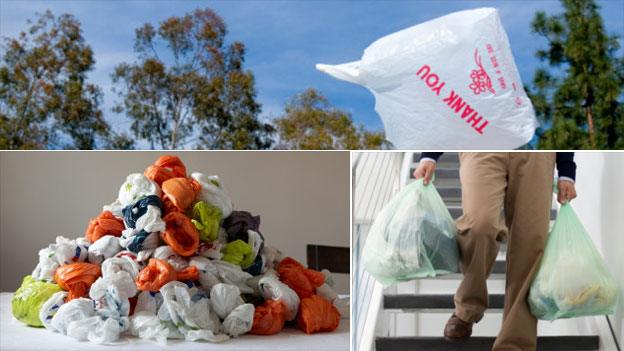
The European Commission is to publish proposals in the spring designed to reduce the number of plastic bags used in Europe each year. Most of the 15,000 people who took part in a public consultation favoured an outright ban - but what are the options?
Every year 800,000 tonnes of so-called single-use plastic bags are used in the European Union - the average EU citizen used 191 of them in 2010, the Commission says, and only 6% were recycled.
More than four billion bags are thrown away each year.
"The impact of this plastic waste can be seen littering our landscape, threatening our wildlife and accumulating as 'plastic soup' in the Pacific Ocean, which may cover more than 15,000,000 sq km," says Environment Commissioner Janez Potocnik.
So what are the options for addressing the problem and where have they been tried?
Complete ban
Last year Italy became the first country in Europe to ban non-biodegradable plastic bags.
A number of countries have banned very thin plastic bags, including China, South Africa, Kenya, Uganda and Bangladesh - in Bangladesh's case, it was found that the bags had clogged up the drainage system, exacerbating deadly floods.
A handful of countries have banned plastic bags altogether, including Rwanda and Somalia, while some like Tanzania have banned ultra-thin bags.
The United Arab Emirates, concerned about pollution and the risk to camels and other animals, has banned all plastic bags except oxo-biodegradables.
British government minister Lord Henley said last year he was "not happy" the use of carrier bags in the UK had risen by 5% in 2010, after four years of decline. He suggested the UK might introduce a ban.
Friends of the Earth are in favour of this as long as alternatives are adequately highlighted, people and shopkeepers have enough time to prepare, and it does not have a "disproportionate impact on the poor".
In the US, local laws muddy the picture. "The city of Los Angeles doesn't have a ban but Los Angeles county does," says Ted Duboise, who runs the Plastic Bag Ban Report website, external. "There is a lot of confusion. You can go to one supermarket and they will have bags and a few miles down the road they're banned."
Bag tax
The Republic of Ireland introduced a charge of 15 euro cents (12p, 20 US cents) per bag in March 2002, which led to a 95% reduction in plastic bag litter. Within a year, 90% of shoppers were using long-life bags.
The levy was raised to 22 cents in 2007, after evidence showed that the number of plastic bags used annually had risen from 21 per person immediately after the ban to 30 (compared with 328 previously).
By this stage, the government had raised 75m euros (£62m, $99m) from the levy, which was put into an Environment Fund and used to reduce waste or research new ways of recycling.
Belgium, Germany, Spain, Norway and the Netherlands are among the countries following Ireland's lead.
Wales introduced a levy of 5p (six euro cents, eight US cents) per bag last year and Northern Ireland will do so next year. Wales also threatens shops that continue to give out bags free of charge with a £5,000 fine.
Jennie Romer, a US lawyer and founder of plasticbaglaws.org, external, says: "Ireland's plastic bag levy is still widely regarded as the most successful charge on plastic bags, in part because the amount of the levy is relatively high and is adjusted based on per capita plastic bag usage."
Long-life bags
If shoppers stop using plastic bags, they must start using other kinds of bags, but there is no perfect solution. Stronger, heavier bags, whether made of fabric or plastic, have a bigger environmental impact than standard supermarket shopping bags.
Last year Britain's Environment Agency published a Life Cycle Assessment of Supermarket Carrier Bags, external, which concluded that long-life bags have to be reused a number of times if they are to be environmentally a better option than standard plastic carrier bags.
For instance, if a plastic bag is used just once, then a paper bag must be used three times to compensate for the larger amount of carbon used in manufacturing and transporting it, a plastic "bag for life" must be used four times, and a cotton bag must be used 131 times.
If a plastic bag is reused, of course, then its carbon footprint per use decreases further - and the number of times the alternatives have to be used to match this low footprint is multiplied.
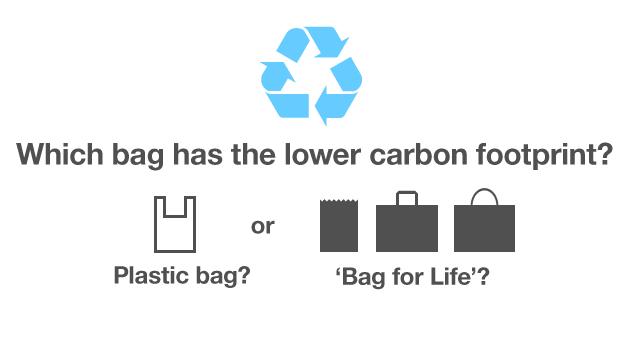
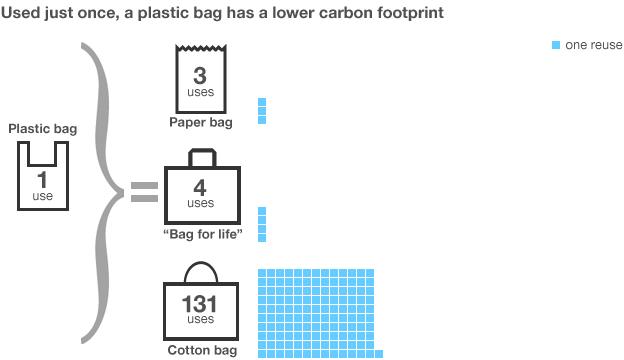
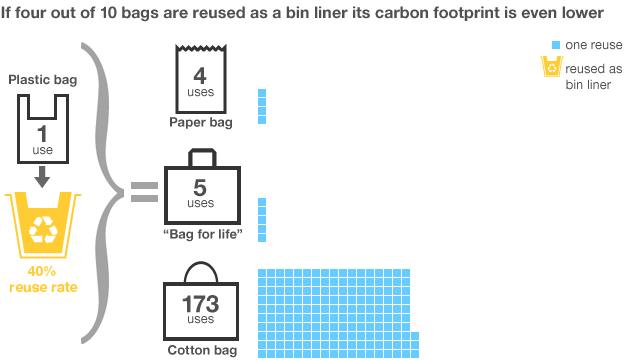
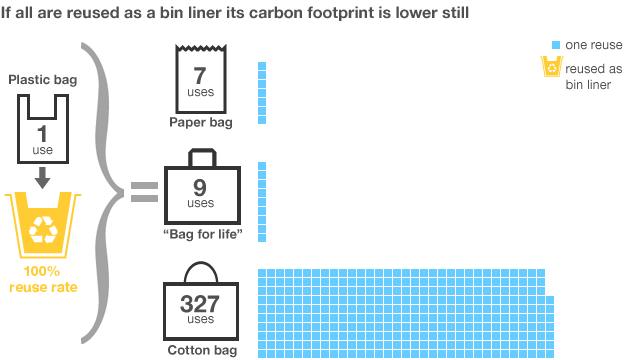
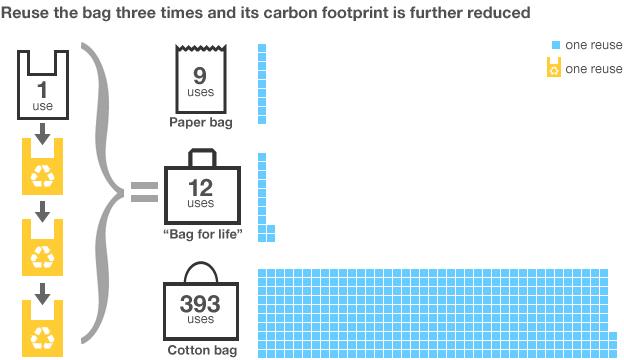
The study took into account the fact that long-life bags are bigger than plastic carrier bags, and that fewer are needed for a weekly shop.
Whatever type of bag is used, the key to reducing the impact is to reuse it as many times as possible either for shopping or as a bin liner.
In 2010, a study by the University of Arizona, external also claimed reusable grocery bags could be a "breeding ground for dangerous food-borne bacteria and pose a serious risk to public health" - though it has to be noted that this work was funded by the American Chemical Council, which includes several plastics manufacturers.
A scientist at the US-based Consumers Union criticised the study, saying that the same amount of bacteria could be found in an average bag of salad, external.
Biodegradable bags
The European Commission is considering introducing better ways of labelling biodegradable and compostable bags.
Compostable bags only biodegrade in industrial composting plants. Biodegradable bags will biodegrade in the natural environment, but come in different types:
Those made of corn will biodegrade in a landfill environment, but while doing so they produce methane, a powerful global warming gas
Another type of bag is oxo-biodegradable, which will biodegrade if exposed to air or water, but not in landfill
Symphony, a British company which manufactures oxo-biodegradable bags, claims it can be "programmed" to biodegrade within six to 18 months.
Symphony's chairman, former Conservative MP Michael Stephen, told the BBC: "There is a huge patch of plastic roughly the size of Texas swirling about in the north Pacific. If it had been oxo-biodegradable it would have disappeared by now."
Mr Stephen said: "Ireland and Wales missed an opportunity to make all the remaining plastic oxo-biodegradable."
But Ms Romer, of plasticbaglaws.org, says: "The term biodegradable is often misleading, which prompted a bill recently signed into law in California prohibiting the sale of most plastic products labelled as 'biodegradable' unless the claim includes a disclaimer."
Mr Stephen agrees: "Suppliers need to be clear as to what kind of biodegradable plastic they are offering and what it will, and will not, do. It would for example be misleading to describe most compostible plastics as biodegradable."
Paper bags
Paper bags have been the traditional shopping bag of choice in the US, but while these biodegrade in landfill, the UK Environment Agency study points out that they have a higher carbon footprint than standard plastic carrier bags.
It also says the available evidence suggests paper bags are not generally reused, either as bin liners - a purpose for which they are not well suited - or for other purposes.
Mr Duboise of the Plastic Bag Ban Report website says pressure from the "powerful wood pulp industry" is one reason paper bags are used in the US.
Over the years, supermarkets drifted towards plastic bags, he says. But, he adds: "A lot of supermarkets are going back to paper bags even though the environmental people say it's just as bad as plastic."